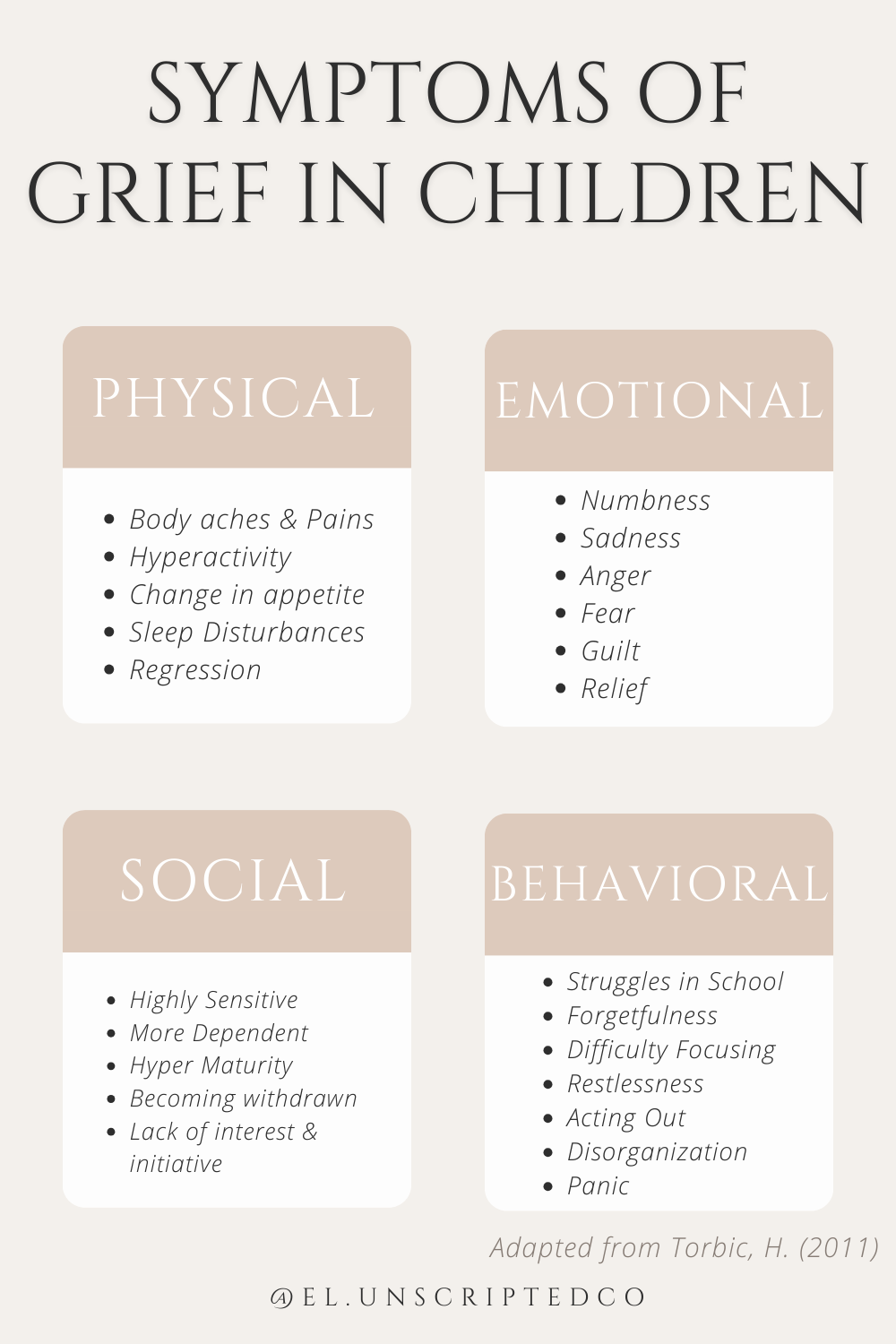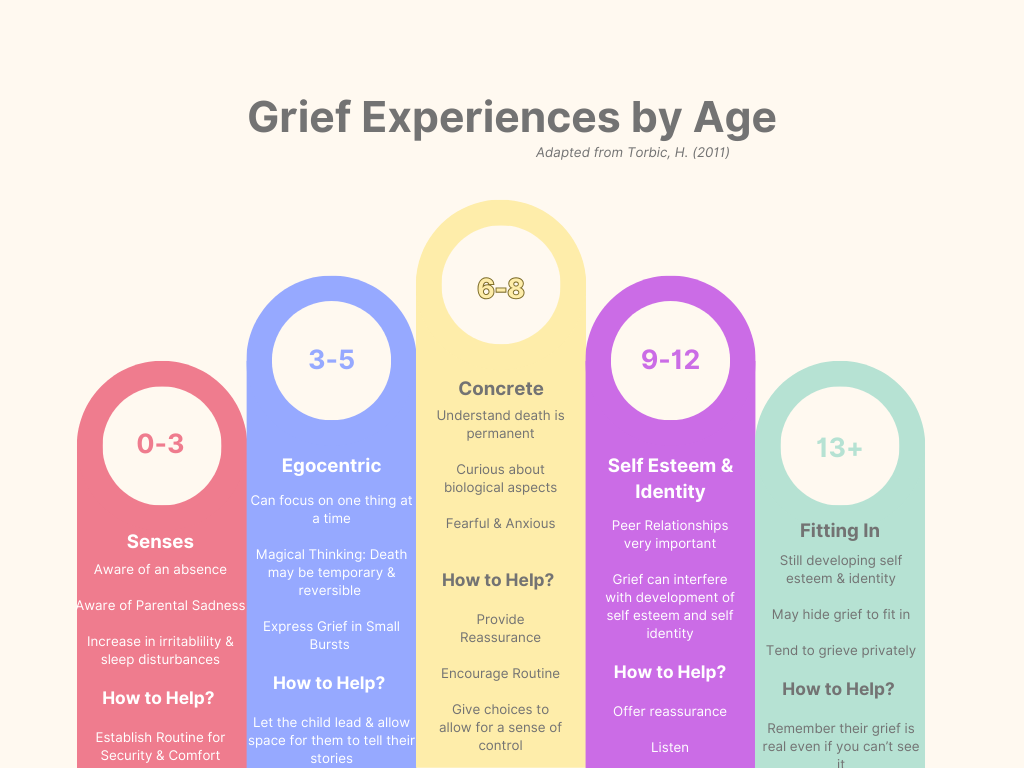Grief & Loss - Children
How do children cope with grief and loss? How can adults support them?
These are big questions and they come up fairly often in parenting groups as we grapple with how to talk to our kids about impending loss, trauma, and the death of loved ones. Children can be considered “disadvantaged mourners” (Torbic, 2011, p. 72) because they are still in the process of developing physically, mentally, and emotionally, and they are reliant on their caregivers to lead the way and help them through difficult processes. We’ve all heard that kids are so resilient - and this may be true in a lot of ways but what really impacts their resilience is the care they receive in the aftermath of difficult experiences.
Depending on the developmental stage the child is in, there are different ways they may experience, express, and process grief.
Symptoms of grief in children can range from the expected tears and sadness, to some more subtle expressions like tummy aches and becoming forgetful. Basically anything goes as kids can have trouble finding the words or feeling safe expressing their emotions. The best we can do is give them some grace, don’t rush it, and keep showing up for them.
In his memoir, Spare, Prince Harry discusses thinking his mom had just gone into hiding and hadn’t actually died. He writes about expecting her to turn up one day in the future and waited for years for this to happen. Reading this was tough for me as I imagined little Harry just waiting for his mom to come back, but I think it is a real example of how kids minds work and how they compensate sometimes for being unprepared to cope with a significant loss and major change in life.
While there are differences in grief for kids of all ages, there are consistencies in how we can support them. First of all, being ready to listen but waiting for them to be ready to talk is a big one. Dr. Bruce Perry discusses “therapeutic dosing” as a way that we may instinctually make our trauma and difficult emotions more manageable, by expressing feelings quickly and moving on, and this can be more predominant in children.
“You can stand the emotional intensity of visiting the wreckage of your trauma-fractured life for only a few seconds before your brain starts to do things to protect you from the pain”. Dr. Perry goes on to discuss an example where a three-year-old boy mentions the death of his mother to a grocery store clerk: “he looks at the clerk, makes one brief comment - five seconds tops - and gets reassurance. That was enough. One little fragment in the wreckage - a dose of therapeutic revisiting that he controlled. Because it is through controllable, brief revisits that the sensitized system can slowly, painfully, be ‘reset’” (Perry & Winfrey, 2021, pp. 112-113).
Increasing opportunities for children and youth to be in control can be beneficial as we walk with them through grief. They have lost something, and have experienced a huge shift in their understandings of the world which can leave them to feel wildly out of control. From simple choices like what shirt to wear to big choices like when and to whom they talk about their feelings, gaining some control back into their lives can be immensely reassuring. Being with them, even quietly, and focusing on regulating activities like eating together, walking together, and listening to music together goes a very long way.
Follow your gut - if you think your child is not coping well or is showing signs of engaging in self harm or suicidal ideations get help right away. Call the national suicide help line at 9-8-8. There are a variety of therapy options for children and youth of all ages these days, from support groups to online chats to in person art/play/music therapy.
Finally, when we are supporting our kids through grief, we must remember to take care of ourselves. The best way to teach kids is through modeling. If you are taking care of yourself, your children are more likely to recognize this as important. Get enough sleep, eat proper meals, schedule visits with your mental health professionals just like you do your physicians.
For more information or supports for helping children through grief and loss, check out the following:
Children’s Grief Centre through Hospice Calgary
Calgary ConnecTeen Phone: 403-264-8336 / Text 587-333-2724
Distress Centre Calgary Phone or Text: 403-266-4357
East Side Community Mental Health Services
Kids Help Phone Phone: 1-800-668-6868 / Text 686868
If there is an emergency with your child’s mental health, you can take them to the Emergency room at Alberta Children’s Hospital or call 9-1-1.
Contributed by Ellery, BSW Practicum Student.
Resources
Harry. (2023). Spare. Random House.
Perry, B.D., & Winfrey, O. (2021). What Happened to You? Conversations on trauma, resilience, and healing. Flatiron Books.
Torbic, H. (2011). Children and Grief: But What About the Children? Home Healthcare Nurse, 29(2), 67–77. https://doi.org/10.1097/NHH.0b013e31820861dd
Graphics created with Canva.
Photos from Unsplash.



